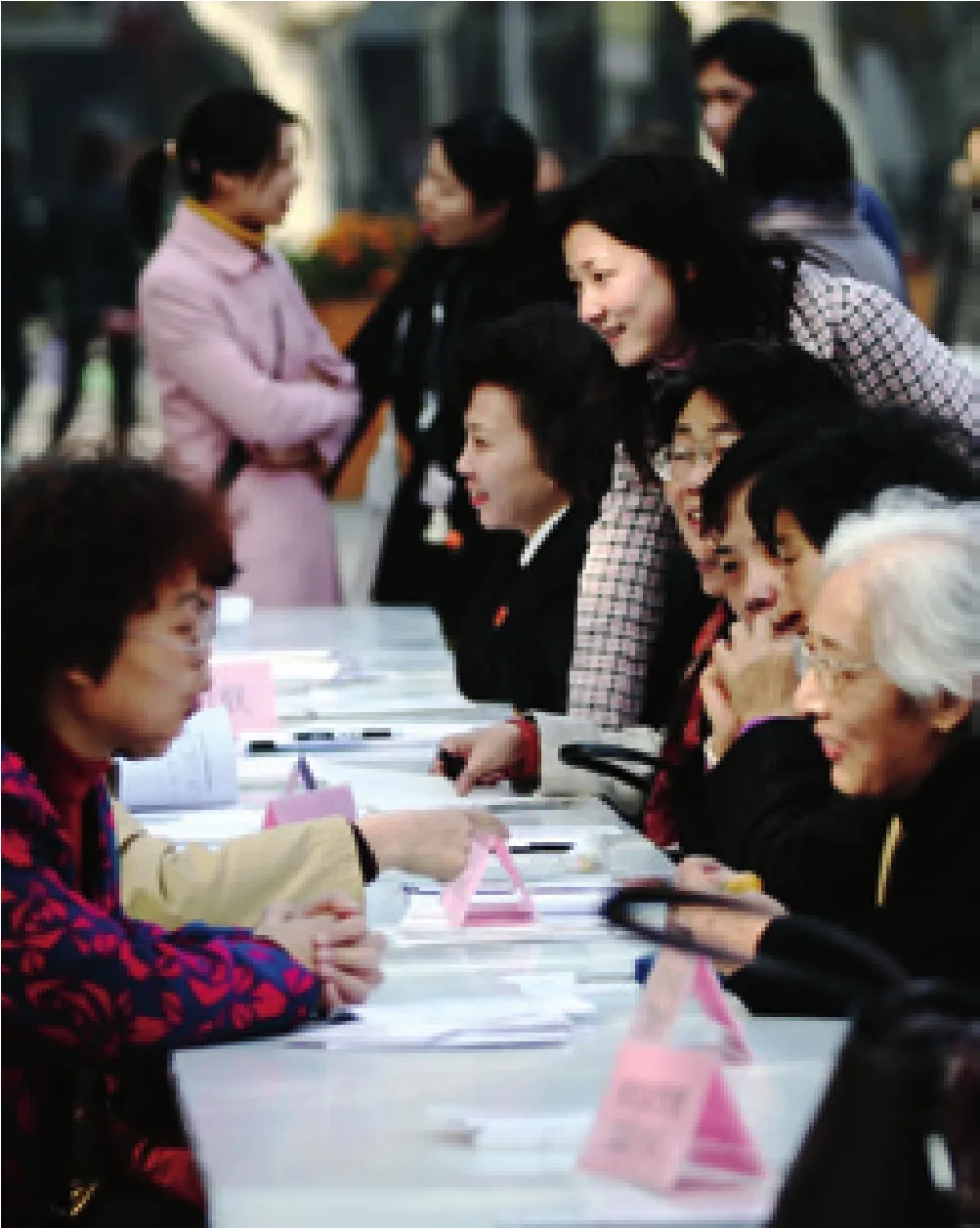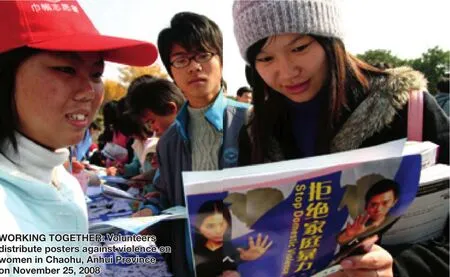Secret Shame Now in The Public Eye
By YUAN YUAN
Secret Shame Now in The Public Eye
By YUAN YUAN
A celebrity wife-beating case has sparked concern on the issue of domestic violence in China
On August 31, a woman using the name “Mother of Lily, Lina and Lydia” posted a picture showing her swollen forehead on her micro-blog at Weibo, one of China’s most popular social media sites.
The woman, whose real name is Kim Lee, is the American wife of Li Yang, who allegedly has helped more than 20 million Chinese learn English with his books, tapes and lectures.
In the text that accompanied the pictures,Kim claimed she was being abused by Li.
On September 1, Kim posted another picture this time showing swollen knees with the words, “Don’t use violence toward me in front of our children.”
The revelations attracted widespread publicity and Li was condemned by the media and ordinary Chinese people. The 42-year-old English teacher, Li, is best known for his special English teaching technique, which he named “Crazy English”—a popular method of language learning that involves yelling at the top of one’s lungs.Many people were astonished at the news of Li’s domestic violence.
“I cannot believe it,” said netizen Helenwoo. “He even held some training classes to teach parents how to educate their children. Who could imagine he would beat his wife in front of his daughters?”
Kim continued to post pictures of the abuse she suffered. She also wrote messages asking Li to see a doctor. On September 4,Kim posted another picture of a bleeding left ear with the words “Li Yang, you need help.”
On September 5, Kim posted the details of the abuse she suffered. “You knocked me to the floor. You sat on my back. You choked my neck with both hands and slammed my head into the floor. When I pried your hands from my neck you grabbed my hair and slammed my head into the fl oor 10 more times!” she said.
Li didn’t respond to his wife’s accusations against him until September 10, when he apologized on his micro-blog. “I wholeheartedly apologize to my wife Kim and my girls for committing domestic violence. This has caused them serious physical and mental damage,” he said.

HU WEIGUO
In another post on the same day, Li revealed he was accepting medical aid to help him overcome his abusive tendencies.
“We are good couple in most of the time,” Li said in an interview with Sina, a popular Web portal. “It is like I am totally out of control when I beat my wife. I think it is a mental problem.”
A growing problem
According to a survey conducted by the All China Women’s Federation(ACWF) in 2010, domestic violence occurs in 30 percent of China’s families, with more than 85 percent of the sufferers being women. About 100,000 Chinese couples divorce each year as a result of domestic violence.
Jiang Yue’e, head of the ACWF’s department for protecting women’s rights and interests, said one in every 10 of the complaints the organization receives involves domestic violence.
“Conjugal violence has grown into a potential threat to social stability,” said Jiang. “The victims are mainly women and children, who suffer both physical and psychological pain.”
A study conducted by the Beijing-based China Law Society supports estimates that more than one third of Chinese families have domestic violence but many are not public about it.
“This is lamentably not a new issue anywhere,” said Liu Xiaojuan, an attorney and Administrative Director of the Anti-Domestic Violence Network (ADVN) of the China Law Society. “But over the last decade China has seen substantial progress as a result of simply bringing the issue of domestic abuse to public attention.”
According to Liu, since her organization was established in 2000, there has been a rapid change in attitudes and an increased awareness regarding the problem of domestic violence across all sections of Chinese society.
However, those working with the network also found patterns of domestic violence in China didn’t conform to their original expectations.
“Before, we thought it’s rural areas and the lower classes that have a higher incidence of domestic violence,” Liu said. “But actually many urban women report being beaten by their well-educated husbands who are doctors, professors or other qualified professionals. That means domestic violence in China not only has an economic dimension but is a more ingrained cultural phenomenon.”
Liu admits domestic violence in China is still regarded as a family issue, something not to be discussed outside the home.
This is echoed by Cesar Chelala, an international public health consultant, who published an article inChina Dailylast October.
“Cultural, economic and social factors such as shame and fear of retaliation from their partners are the cause of women’s reluctance to denounce these acts. As in other countries, domestic violence in China is not only widespread, but also considered a private matter, which makes it very dif fi cult for women to get a proper response from the police and the judiciary,” said Chelala in the article.

LET ME HELP YOU: Workers from the Women’s Federation of Nanjing, Jiangsu Province, offer advice to residents at an activity marking International Day for the Elimination of Violence Against Women on November 25, 2005

XIN HUA
Chelala also said physically tortured women are more susceptible to a variety of health problems such as depression, suicide,as well as alcohol and drug abuse.
According to the World Health Organization, nearly half of the women victims of homicide around the world are killed by their current or former husbands or boyfriends.
Aid channels
“All perpetrators of domestic violence have this or that psychological problem,”said Wang Xingjuan, founder of the Maple Women’s Psychological Counseling Center,a non-profit organization in Beijing. “We have to provide channels that allow victims to protect themselves before we start treating the abusers.”
Wang explained over the last 10 years,more and more social aid channels, such as legal aid and social and medical interventions, have become available to victims.
“We’ve been trying to launch pilot programs, through which we help women organize their own selfhelp groups,” Wang said.
In August 2008, a court in Wuxi, east China’s Jiangsu Province, issued an order prohibiting a husband from beating or intimidating his wife. This was the fi rst time a court granted judicial protection for personal safety within marriage.
In November 2009, Shanghai established an aid center against domestic violence, the first in China, to offer temporary accommodation for victims. Several aid centers of this kind were set up in other regions of the country.
“This is far from sufficient,compared to the number of victims,what we have done is not even close to meeting the need. The aid centers are also facing some operational dif fi culties,” Wang said.
During the first month of its operations, the Shanghai aid center received nobody at all. “I wanted to turn to it for help but the admission procedures are too complex and rigorous,” said a woman with the surname Zhu who claimed to be a victim of domestic violence.
It’s stipulated to enter the facility,an applicant needs to go to the police to fi ll in a form and to get proof of he or she having been attacked from the local community of fi ce.
“I think it is my privacy and I don’t want so many people to know that,” Zhu said.
“This is also the reason that it is hard for the police to effectively deal with domestic violence,” said Liu, the attorney.“Police of fi cers aren’t trained to intervene in domestic disputes; they don’t know how to deal with it.”
Liu said the most tragic example was that of Dong Shanshan, a 26-year-old woman who was beaten to death last year by her husband even though she called the police several times.
Women’s organizations responded to Dong’s death by demanding more effective legislation on domestic violence.
On August 14, the Standing Committee of the National People’s Congress, the country’s top legislature, said it had started drafting an anti-domestic violence law. It will be the country’s fi rst special law on domestic violence.
Jiang Yue’e from the ACWF said, “The ACWF is assisting in drafting the law. In order to accelerate the legislative process, the federation has drafted a proposed version of the law and hopes it will provide a reference for legislators.”

